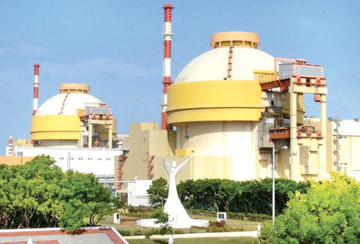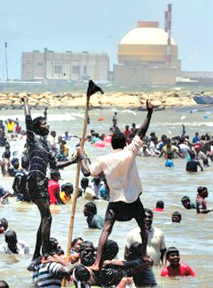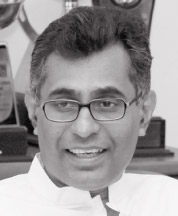|
Danger not ruled out:
Kudankulam nuclear safety talks to continue
By Manjula FERNANDO
India's Kudankulam nuclear plant located in the southern most tip of
India, within the Tamil Nadu state, barely 200 km away from Puttalam as
against 450km to Chennai, has already roused public outrage there. It is
claimed the location of the plant was badly devastated during the 2004
Boxing day tsunami.
|

The Reactors of the Kudankulam atomic energy plant, Tamil Nadu.
The plant on the verge of completion at an estimated $2.6
billion mega project has been classified as “clean and safe” by
India’s former president and nuclear scientist Abdul Kalam.
Courtesy: The Hindu |
With TNA the political party that claims to be the sole
representatives of the Tamil people of Sri Lanka being unusually quiet
on the issue, despite the fact if a disaster is to occur Tamil citizens
living in the Northern parts of the country will be among the most
affected, the Sunday Observer contacted Power and Energy Minister Patali
Champika Ranawaka to shed light on the safety measures discussed at the
Indo-Lanka Talks held recently in Delhi and Sri Lanka's own ambitions to
exploit nuclear energy.
Question: The first round of Indo-Lanka Civil Nuclear cooperation
talks were held in India recently.
Has Sri Lanka signed an agreement with India on the safety
precautions in relation to Kudankulam, if so are you fully satisfied
with the terms in the document?
Answer: No we have not signed an agreement with India as yet. We have
proposed a draft agreement, a bilateral agreement between India and Sri
Lanka, prepared in May 2011.
Thereafter various ideas and letters were exchanged between the two
parties. But this agreement is yet to be finalised.
The next round of talks is scheduled to be held in Sri Lanka. There
are three international conventions on Nuclear safety so accordingly,
the International Atomic Energy Authority and Indian Atomic Energy
Authority, their regulatory body, are bound by law to implement
international standards in their plants.
As a concerned neighbouring country which can be affected by a
possible calamity we too have suggested a few things.
We have pointed out to India that we should have a bilateral
agreement to cope with nuclear accidents and radiation leaks.
 |
|
One of the chain protests
in Kudankulam
against the nuclear plant. Courtesy: Deccan Chronicle |
In addition, there are suggestions to have a comprehensive civil
nuclear agreement between India and Sri Lanka, that is to develop
various other nuclear related applications.
There are also on-going activities to develop non energy
applications, to carry out non-destructive testing, for the use of
nuclear science and radiation technology to test stability of civil
structures and architectural structures, like dams, bridges and
buildings.
This centre which will also serve as a capacity building and a
training location for officials, will be set up close to Kiribathgoda in
Kelaniya in 2014.
We also plan to acquire Gamma radiation technology for the purpose of
sterilising food items and surgical gloves. A station is under
construction in Biyagama, with a completion target by 2014.
This is aimed at strengthening our export sector in particular.
Another area where nuclear technology is to be introduced, is to detect
cracks and leaks in reservoir dams throughout the country. A new centre
for this purpose is being proposed at Samanala Wewa.
Agriculture
We have also proposed to use this technology to develop our
agriculture sector, to develop hybrid plant varieties that are resistant
to pests and weeds, so that our dependence on chemical agro products can
be gradually minimised. This is a technology extensively used in Israel.
The Agricultural Department's Gannoruwa location will have this
centre in the near future. Carbon dating technology is one other thing
for which Sri Lanka has sought foreign expertise. At the moment we have
to send away all the artifacts to read their historical blueprint. Our
intention is to set up an accredited laboratory here to do our carbon
dating studies. Nuclear technology can also be used to detect the
presence of heavy metal such as arsenic in drinking water, which is
harmful to kidneys.
We are getting support from the international community to upgrade
and develop nuclear technology in a number of fields. India, US,
International Atomic Energy Authority, Pakistan, Russia and China are
some of the countries and organisations that have offered their
expertise.
Q: The global environment watchdog Greenpeace has expressed
concerns about the upcoming Kudankulam nuclear plant. They have claimed
that the existing leakage monitoring system is not up to standard. How
concerned are you about this?
|

Minister Patali Champika Ranawaka |
A: Some 36 countries in the world are using nuclear energy.
Over 300 nuclear plants are currently in operation all over the world.
There are international standards that have to be guided by the
countries which have put up nuclear reactors for power generation,
including the ones in India. The IAEA must ensure that India is not
breaching these international standards.
The hazards involving nuclear plants include explosions, like in
Ukraine's Chernobyl plant. But the new reactors of nuclear plants are
now built in protective containers. The question of explosions can be
ruled out in time to come.
But radiation leakage would still be a concern, it is the most
probable accident that can happen. Such accidents have happened in
India. Not just Kudankulam but Kalpakkam reactor, also in Southern
India, is closer to Sri Lanka,
This is only 300km away from Jaffna and is now operational. Of course
the risk is there. We cannot claim we are in immediate danger or 100
percent safe.
It is their sovereign right to put up a power plant. But at the same
time it is our duty to protect our country and ask India to make us
aware of the safety networks. In the meantime, we are preparing our own
early warning system and a mitigation plan.
We have joined with the Disaster Management Centre to draw up this
plan.
Accidents
Q: One part of the discussion was nuclear safety and response
to nuclear accidents. What were the points discussed at the first round
of these talks and have you reached any agreements?
A: We have not yet reached any agreement. But discussions are
on with the Indian officials. With or without agreement, we are duty
bound to protect our people. We will have our own mitigation plan and we
will implement it.
Q: Sri Lanka too was very ambitious to exploit or introduce
nuclear power as a source of power generation. In the aftermath of
Fukushima disaster, have we put our plans in the backburner?
A: No. In our case we have to study new trends in nuclear
energy, new safety techniques. Because of the scarcity of fossil fuels
and their exhaustible nature, and the alarming trends of climatic change
caused by their use, we have to think of alternative sources. Nuclear
power is looked into as an option. We are aware of the risks that come
along, disasters like Chernobyl and Fukushima teach us many lessons.
The safe disposal of nuclear waste is another issue. The science is
evolving. The scientists are looking into the possibility of using
Thorium in place of Uranium. This will eliminate many safety issues that
are currently dogging states. Thorium is in abundance in many countries.
Sri Lanka too has a large deposit of Thorium. Our study team will take
stock of all these aspects before a final report is submitted.
Q: Do you think the international community or India for that
matter, will approve of any attempts by Sri Lanka to acquire nuclear
power even for non-destructive efforts?
A: A section of Indian media tried to tarnish our image
deliberately concocting a story that Sri Lanka is going to put up a
nuclear power plant in Sampur with Pakistani help. It is a blatant lie
propagated by some people here and abroad. When India voted against Sri
Lanka in Geneva last year (when a US backed resolution was taken up),
some sections within India expressed resentment to this stance, their
voice clashed with the Tamil Nadu view point.
I believe reports like that are intended to make use of anti Pakistan
sentiments to quieten pro Sri Lanka voices. This type of media
propaganda is very detrimental. We are not going to enrich uranium or
get Pakistan help to do that.
Demand
Q: If Sri Lanka had to shelve plans for nuclear power for some
reason, are there alternative ways for the country to reach energy
sufficiency in the future?
A: As far as the global demand is concerned..... Mahatma
Gandhi once said we have enough resources for our survival but not to
satisfy our greediness. There are no energy sources that can satisfy
human greediness. Unless we change our life patterns, we may not survive
on this planet. Before we exhume all coal and oil deposits, there will
be serious price fluctuations. Already our demand for power is 120 times
more than what our biological needs require. We have to control this
insatiable consumption. This has driven us to extreme measures for power
generation. We have to exploit every technology that is available to
face the challenge of growing energy demand. If nuclear power is safe
enough to provide energy for our domestic use, then we must use it. But
first we have to study this relatively new technology.
Q: Lankan environmentalists have cautioned that Kudankulam
plant will have a greater effect on our fish harvest, and on our
environment due to migratory birds and North-eastern monsoon?
A: Yes there will be an issue if there is a radiation leakage.
In Fukushima there was this issue. But there is no proof to say that
radiation has leaked from Kalpakkam or Kudankulam. We have already
installed radiation detectors, we have already begun measuring radiation
levels.
The Sri Lanka team at the Indo Lanka Civil Nuclear cooperation talks
comprised Foreign Ministry Additional Secretary I. Amza, Power and
Energy Ministry additional Secretary (Technical) Ranjith Gunawardena,
Advisor to the Ministry K.K.Y.W. Perera, Atomic Energy Authority
Chairman Dr. Ranjith Wijewardena, Senior Scientist Anil Ranjith and a
representative from the Finance Ministry.
High handed act, environmental activist Jagath Gunawardena opines
“Our main worry is the probability of an accident or a nuclear leak
in the Kudankulam plant, resulting in contamination of our environment
and the subsequent danger to our people, because of its close proximity
to our Northern coast.
There are three ways of radio active contamination reaching Sri
Lanka.One is through the air, the north-eastern monsoonal winds travel
via this region.The second way affecting Sri Lanka is the contamination
of the sea, through the bio-magnification process of the radioactive
material going through the various living organisms.
The third is through the migratory birds because their eastern
migratory route falls via Kudankulam region. Birds may get contaminated
by radio active material and their excreta or dead bodies will
contaminate our environment, especially the North and East of the
country.
These things are probabilities but we have to look into all
possibilities and probabilities and take precautionary action on how to
deal with the contingencies.
I am happy that the Atomic Energy Authority and the Ministry of Power
and Energy is doing the ‘little’ that they could do, but as
environmentalists we are not satisfied with the efforts by some direct
stakeholders.
The Government should appoint an intergovernmental body to tackle
this as a whole. The Central Environmental Authority, Marine Pollution
Prevention Authority, Wild Life Department, Fisheries Department and the
Disaster Management Centre must join forces to device a contingency plan
to face any eventuality that may arise with the Kudankulam facility.
My view is that the location of this atomic plant is unsuitable
because if the Indian authorities were not very much concerned about the
accidents they could have put up this facility in the middle of the
country.
They have placed it in a strategic way where most of the
contamination will be released to the sea or blown into the sea,
ultimately resulting in part of it being blown into Sri Lanka. I think
Indian Government is taking a very high handed and haughty attitude
towards Sri Lanka on this issue.” |


